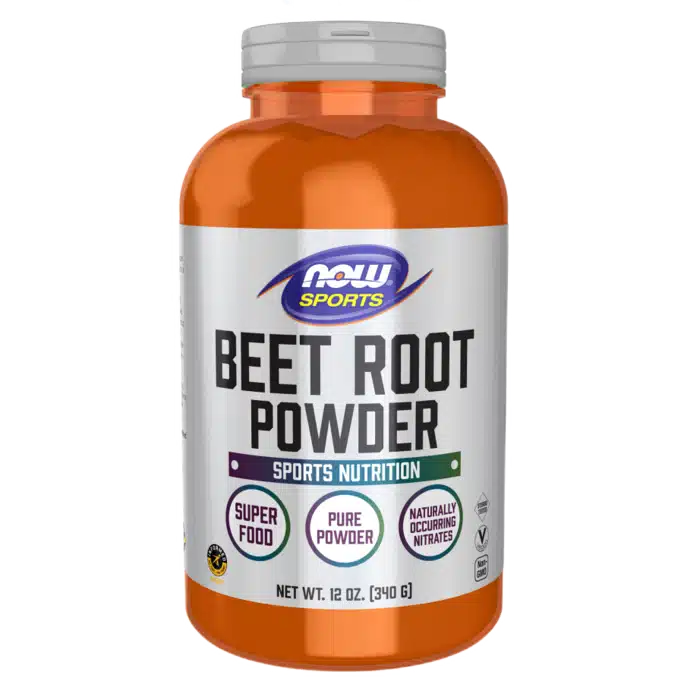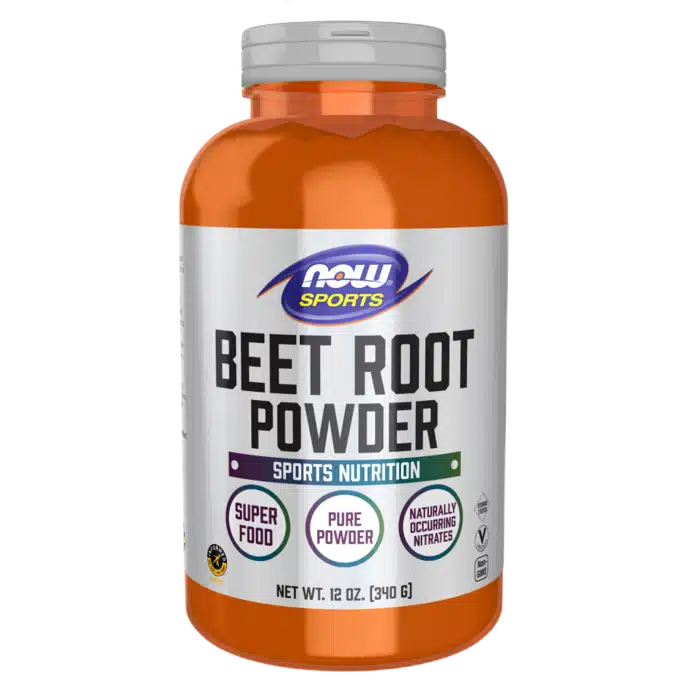Sold out
Beet Root Powder 340g - Now
€28,59 EUR
Unit price
/
Unavailable
Beet Root Powder 340g - Now is backordered and will ship as soon as it is back in stock.
Description
Description
NOW® Sports Beet Root Powder is a highly nutritious vegetable superfood.
NOW Beet Root Powder is indicated for:
– Improve blood circulation
– Reduce Blood Pressure
– Improve Performance during Physical Exercise
– Improve Cognitive Function
NOW® Sports Beet Root Powder is a pure derivative of dried, unextracted beets (non-GMO). Beetroot (Beta vulgaris) is a true superfood, a highly nutritious vegetable rich in vitamins and minerals such as potassium, sodium, iron, folic acid, phosphorus, magnesium, calcium, vitamin C, and B vitamins such as thiamine, niacin, and riboflavin.
NOW Beet Root Powder also contains nitrates and inorganic pigments (anthocyanins, carotenoids, lutein/zeaxanthin), both of which have numerous health benefits. Each serving of Beet Root Powder is equivalent to 2.5 whole beets.
Beets have been linked to numerous health benefits, including improved blood flow, lower blood pressure, and improved exercise performance.
Many of these benefits are due to its high content of inorganic nitrates (nitrates, nitrites and nitric oxide).
Most dietary nitrates (80-95%) are obtained from fruits and vegetables. On the other hand, dietary nitrites are obtained from food additives, baked goods, cereals, and processed or cured meats. Several studies show that foods rich in nitrites and nitrates can have positive health effects, including lowering blood pressure, which reduces the risk of cardiovascular disease.
The body can convert the nitrates found in beets into nitric oxide. This substance "travels" through arterial walls, sending signals to the tiny muscle cells surrounding the arteries, helping them relax. When these muscle cells relax, blood vessels dilate and blood pressure decreases, thus preventing hypertension.
Heart disease (heart attacks, heart failure, and stroke) is a leading cause of death worldwide. And high blood pressure is a major risk factor for developing these conditions.
Studies have shown that beets can significantly reduce blood pressure by up to 4-10 mmHg (millimeters of mercury) in just a few hours.
The effect appears to be more noticeable in systolic blood pressure (the maximum value reached when the heart contracts) than in diastolic blood pressure (the minimum value when the heart then stretches and relaxes).
Blood nitrate levels remain elevated for about six hours after ingestion. Therefore, beets have only a temporary effect on blood pressure, and regular consumption is necessary to experience long-term blood pressure reductions.
Nitrates found in food can even improve physical performance. For this reason, beets are often used by athletes.
In two studies, it was concluded that daily consumption of beets over a period of six days prolonged the time to exhaustion during high-intensity exercise by 15 to 25%, which represents a 1 to 2% improvement in overall performance.
Beets can also improve athletic performance in cycling by increasing oxygen utilization by up to 20%. A small study analyzed the effect of 500 ml of beet juice on cycling time trial performance over 4 and 16.1 km and concluded that consumption of this vegetable improved performance by 2.8% during the 4 km time trial and 2.7% during the 16.1 km time trial.
It's important to note that blood nitrate levels peak after 2 to 3 hours of consumption. Therefore, to maximize your potential, it's best to consume beets 2 to 3 hours before training or competition.
These results are due to increased blood flow to the working muscle, improved mitochondrial efficiency, and/or improved muscle contraction. There is strong evidence to suggest that dietary nitrate intake increases muscle tissue oxygenation. Increased blood flow to the working muscle allows for greater oxygen transport, which may result in more efficient metabolic control and increased time to exhaustion, thus improving physiological performance.
Furthermore, beetroot juice improved mitochondrial efficiency due to greater efficiency of oxidative phosphorylation, a metabolic pathway that uses the energy released by the oxidation of nutrients to produce adenosine triphosphate (ATP).
Beetroot juice consumption also appears to decrease skeletal muscle phosphocreatine utilization and the production of adenosine diphosphate (ADP) and inorganic phosphate (PI), indicating a reduction in ATP production. This effect suggests that nitrate intake may alter ATP consumption rates during muscle contraction, thus prolonging the time to exhaustion.
The nitrates found in beets may even improve mental and cognitive function, which tends to decline with age.
Beets particularly improve blood flow to the frontal lobe of the brain, an area associated with higher-level thinking such as decision-making and working memory.
Recently, scientists have discovered a complex method by which hard-working brain cells get even more oxygen. It's called "neurovascular coupling," and it involves a complex set of cells and signaling molecules working together to increase blood flow to brain cells that need a temporary boost of oxygen to function at peak efficiency.
Recent studies have also shown that taking beets before exercise can significantly reduce the so-called Cerebral Augmentation Index. This index essentially measures the undesirable stiffness of the arteries in the brain. Cardiovascular disease is typically characterized by stiffening of the arteries. When this occurs in the brain, it can affect its ability to obtain the necessary amounts of oxygen for performing tasks considered more demanding. A high Cerebral Augmentation Index is typically linked to cognitive decline.
The brain and nervous system depend on nitric oxide for proper functioning. A recent study demonstrated that a dose of beetroot juice increases blood flow to the brain and results in measurable improvements in cognitive performance. Subjects ingested approximately 450 ml of beetroot juice 90 minutes before starting exercise.
Due to the potential effects of nitrate on blood flow, it is possible that they may increase blood flow and improve brain function by facilitating the supply of oxygen and nutrients to the brain.
340 g powder
NOW Beet Root Powder is indicated for:
– Improve blood circulation
– Reduce Blood Pressure
– Improve Performance during Physical Exercise
– Improve Cognitive Function
Beet Root Powder 340g - Now
NOW® Sports Beet Root Powder is a pure derivative of dried, unextracted beets (non-GMO). Beetroot (Beta vulgaris) is a true superfood, a highly nutritious vegetable rich in vitamins and minerals such as potassium, sodium, iron, folic acid, phosphorus, magnesium, calcium, vitamin C, and B vitamins such as thiamine, niacin, and riboflavin.
NOW Beet Root Powder also contains nitrates and inorganic pigments (anthocyanins, carotenoids, lutein/zeaxanthin), both of which have numerous health benefits. Each serving of Beet Root Powder is equivalent to 2.5 whole beets.
Beets have been linked to numerous health benefits, including improved blood flow, lower blood pressure, and improved exercise performance.
Many of these benefits are due to its high content of inorganic nitrates (nitrates, nitrites and nitric oxide).
Most dietary nitrates (80-95%) are obtained from fruits and vegetables. On the other hand, dietary nitrites are obtained from food additives, baked goods, cereals, and processed or cured meats. Several studies show that foods rich in nitrites and nitrates can have positive health effects, including lowering blood pressure, which reduces the risk of cardiovascular disease.
The body can convert the nitrates found in beets into nitric oxide. This substance "travels" through arterial walls, sending signals to the tiny muscle cells surrounding the arteries, helping them relax. When these muscle cells relax, blood vessels dilate and blood pressure decreases, thus preventing hypertension.
Heart disease (heart attacks, heart failure, and stroke) is a leading cause of death worldwide. And high blood pressure is a major risk factor for developing these conditions.
Studies have shown that beets can significantly reduce blood pressure by up to 4-10 mmHg (millimeters of mercury) in just a few hours.
The effect appears to be more noticeable in systolic blood pressure (the maximum value reached when the heart contracts) than in diastolic blood pressure (the minimum value when the heart then stretches and relaxes).
Blood nitrate levels remain elevated for about six hours after ingestion. Therefore, beets have only a temporary effect on blood pressure, and regular consumption is necessary to experience long-term blood pressure reductions.
Nitrates found in food can even improve physical performance. For this reason, beets are often used by athletes.
In two studies, it was concluded that daily consumption of beets over a period of six days prolonged the time to exhaustion during high-intensity exercise by 15 to 25%, which represents a 1 to 2% improvement in overall performance.
Beets can also improve athletic performance in cycling by increasing oxygen utilization by up to 20%. A small study analyzed the effect of 500 ml of beet juice on cycling time trial performance over 4 and 16.1 km and concluded that consumption of this vegetable improved performance by 2.8% during the 4 km time trial and 2.7% during the 16.1 km time trial.
It's important to note that blood nitrate levels peak after 2 to 3 hours of consumption. Therefore, to maximize your potential, it's best to consume beets 2 to 3 hours before training or competition.
These results are due to increased blood flow to the working muscle, improved mitochondrial efficiency, and/or improved muscle contraction. There is strong evidence to suggest that dietary nitrate intake increases muscle tissue oxygenation. Increased blood flow to the working muscle allows for greater oxygen transport, which may result in more efficient metabolic control and increased time to exhaustion, thus improving physiological performance.
Furthermore, beetroot juice improved mitochondrial efficiency due to greater efficiency of oxidative phosphorylation, a metabolic pathway that uses the energy released by the oxidation of nutrients to produce adenosine triphosphate (ATP).
Beetroot juice consumption also appears to decrease skeletal muscle phosphocreatine utilization and the production of adenosine diphosphate (ADP) and inorganic phosphate (PI), indicating a reduction in ATP production. This effect suggests that nitrate intake may alter ATP consumption rates during muscle contraction, thus prolonging the time to exhaustion.
The nitrates found in beets may even improve mental and cognitive function, which tends to decline with age.
Beets particularly improve blood flow to the frontal lobe of the brain, an area associated with higher-level thinking such as decision-making and working memory.
Recently, scientists have discovered a complex method by which hard-working brain cells get even more oxygen. It's called "neurovascular coupling," and it involves a complex set of cells and signaling molecules working together to increase blood flow to brain cells that need a temporary boost of oxygen to function at peak efficiency.
Recent studies have also shown that taking beets before exercise can significantly reduce the so-called Cerebral Augmentation Index. This index essentially measures the undesirable stiffness of the arteries in the brain. Cardiovascular disease is typically characterized by stiffening of the arteries. When this occurs in the brain, it can affect its ability to obtain the necessary amounts of oxygen for performing tasks considered more demanding. A high Cerebral Augmentation Index is typically linked to cognitive decline.
The brain and nervous system depend on nitric oxide for proper functioning. A recent study demonstrated that a dose of beetroot juice increases blood flow to the brain and results in measurable improvements in cognitive performance. Subjects ingested approximately 450 ml of beetroot juice 90 minutes before starting exercise.
Due to the potential effects of nitrate on blood flow, it is possible that they may increase blood flow and improve brain function by facilitating the supply of oxygen and nutrients to the brain.
340 g powder
Specifications
Specifications
-
Warnings



